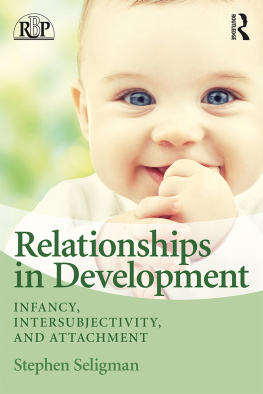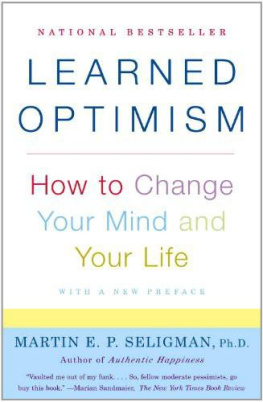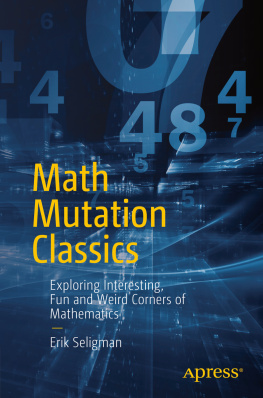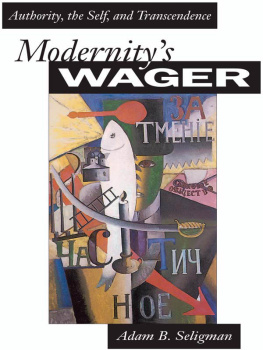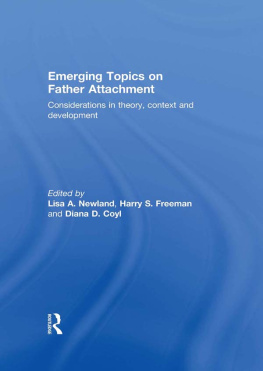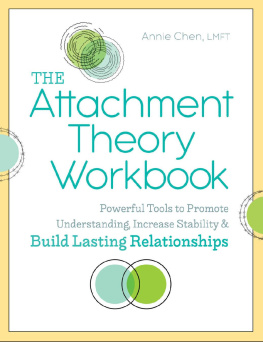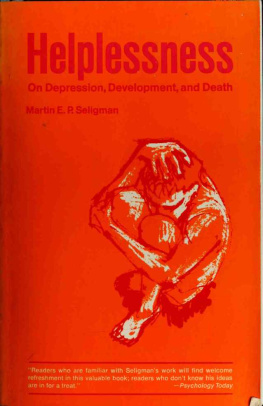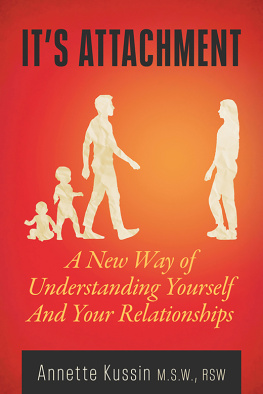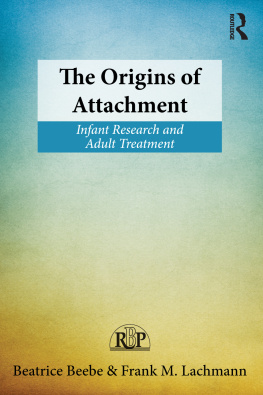Seligman - Relationships in development : infancy, intersubjectivity, and attachment
Here you can read online Seligman - Relationships in development : infancy, intersubjectivity, and attachment full text of the book (entire story) in english for free. Download pdf and epub, get meaning, cover and reviews about this ebook. year: 2018, publisher: Routledge, genre: Home and family. Description of the work, (preface) as well as reviews are available. Best literature library LitArk.com created for fans of good reading and offers a wide selection of genres:
Romance novel
Science fiction
Adventure
Detective
Science
History
Home and family
Prose
Art
Politics
Computer
Non-fiction
Religion
Business
Children
Humor
Choose a favorite category and find really read worthwhile books. Enjoy immersion in the world of imagination, feel the emotions of the characters or learn something new for yourself, make an fascinating discovery.
- Book:Relationships in development : infancy, intersubjectivity, and attachment
- Author:
- Publisher:Routledge
- Genre:
- Year:2018
- Rating:4 / 5
- Favourites:Add to favourites
- Your mark:
- 80
- 1
- 2
- 3
- 4
- 5
Relationships in development : infancy, intersubjectivity, and attachment: summary, description and annotation
We offer to read an annotation, description, summary or preface (depends on what the author of the book "Relationships in development : infancy, intersubjectivity, and attachment" wrote himself). If you haven't found the necessary information about the book — write in the comments, we will try to find it.
Seligman: author's other books
Who wrote Relationships in development : infancy, intersubjectivity, and attachment? Find out the surname, the name of the author of the book and a list of all author's works by series.
Relationships in development : infancy, intersubjectivity, and attachment — read online for free the complete book (whole text) full work
Below is the text of the book, divided by pages. System saving the place of the last page read, allows you to conveniently read the book "Relationships in development : infancy, intersubjectivity, and attachment" online for free, without having to search again every time where you left off. Put a bookmark, and you can go to the page where you finished reading at any time.
Font size:
Interval:
Bookmark:

Relationships in Development
The recent explosion of new research about infants, parental care, and infantparent relationships has shown conclusively that human relationships are central motivators and organizers in development. Relationships in Development examines the practical implications for dynamic psychotherapy with both adults and children, especially following trauma. Stephen Seligman offers engaging examples of infantparent interactions as well as of psychotherapeutic process. He traces the place of childhood and child development in psychoanalysis from Freud onward, showing how different images about babies evolved and influenced analytic theory and practice.
Relationships in Development offers a new integration of ideas that updates established psychoanalytic models in a new context: Relational-developmental psychoanalysis. Seligman integrates four crucial domains:
Infancy Research, including attachment theory and research
Developmental Psychoanalysis
Relational/intersubjective Psychoanalysis
Classical Freudian, Kleinian, and Object Relations theories (including Winnicott).
An array of specific sources are included: developmental neuroscience, attachment theory and research, studies of emotion, trauma and infantparent interaction, and nonlinear dynamic systems theories. Although new psychoanalytic approaches are featured, the classical theories are not neglected, including the Freudian, Kleinian, Winnicottian, and Ego Psychology orientations. Seligman links current knowledge about early experiences and how they shape later development with the traditional psychoanalytic attention to the irrational, unconscious, turbulent, and unknowable aspects of the mind and human interaction. These different fields are taken together to offer an open and flexible approach to psychodynamic therapy with a variety of patients in different socioeconomic and cultural situations.
Relationships in Development will appeal to psychoanalysts, psychoanalytic psychotherapists, and graduate students in psychology, social work, and psychotherapy. The fundamental issues and implications presented will also be of great importance to the wider psychodynamic and psychotherapeutic communities.
Stephen Seligman is Clinical Professor of Psychiatry at the University of California, San Francisco; Joint Editor-in-Chief of Psychoanalytic Dialogues; Training and Supervising Analyst at the San Francisco Center for Psychoanalysis and Psychoanalytic Institute of Northern California; and Clinical Professor at the New York University Postdoctoral Program in Psychoanalysis. He is also co-editor of the American Psychiatric Press Infant and Early Childhood Mental Health: Core Concepts and Clinical Practice .
Relational Perspectives Book Series
Lewis Aron & Adrienne Harris
Series Co-Editors
Steven Kuchuck & Eyal Rozmarin
Associate Editors

The Relational Perspectives Book Series (RPBS) publishes books that grow out of or contribute to the relational tradition in contemporary psychoanalysis. The term relational psychoanalysis was first used by Greenberg and Mitchell to bridge the traditions of interpersonal relations, as developed within interpersonal psychoanalysis and object relations, as developed within contemporary British theory. But, under the seminal work of the late Stephen A. Mitchell, the term relational psychoanalysis grew and began to accrue to itself many other influences and developments. Various tributariesinterpersonal psychoanalysis, object relations theory, Self Psychology, empirical infancy research, and elements of contemporary Freudian and Kleinian thoughtflow into this tradition, which understands relational configurations between self and others, both real and fantasied, as the primary subject of psychoanalytic investigation.
We refer to the relational tradition, rather than to a relational school, to highlight that we are identifying a trend, a tendency within contemporary psychoanalysis, not a more formally organized or coherent school or system of beliefs. Our use of the term relational signifies a dimension of theory and practice that has become salient across the wide spectrum of contemporary psychoanalysis. Now under the editorial supervision of Lewis Aron and Adrienne Harris, with the assistance of Associate Editors Steven Kuchuck and Eyal Rozmarin, the Relational Perspectives Book Series originated in 1990under the editorial eye of the late Stephen A. Mitchell. Mitchell was the most prolific and influential of the originators of the relational tradition. Committed to dialogue among psychoanalysts, he abhorred the authoritarianism that dictated adherence to a rigid set of beliefs or technical restrictions. He championed open discussion, comparative and integrative approaches, and promoted new voices across the generations.
Included in the Relational Perspectives Book Series are authors and works that come from within the relational tradition, extend and develop that tradition, as well as works that critique relational approaches or compare and contrast it with alternative points of view. The series includes our most distinguished senior psychoanalysts, along with younger contributors who bring fresh vision. A full list of titles in this series is available at https://www.routledge.com/mentalhealth/series/LEARPBS.
Note
Greenberg, J. & Mitchell, S. (1983). Object relations in psychoanalytic theory. Cambridge, MA: Harvard University Press.
Relationships in Development
Infancy, Intersubjectivity, and Attachment
Stephen Seligman

First published 2018
by Routledge
2 Park Square, Milton Park, Abingdon, Oxon OX14 4RN
and by Routledge
711 Third Avenue, New York, NY 10017
Routledge is an imprint of the Taylor & Francis Group, an informa business
2018 Stephen Seligman
The right of Stephen Seligman to be identified as author of this work has been asserted by him in accordance with sections 7 and 78 of the Copyright, Designs and Patents Act 1988.
All rights reserved. No part of this book may be reprinted or reproduced or utilised in any form or by any electronic, mechanical, or other means, now known or hereafter invented, including photocopying and recording, or in any information storage or retrieval system, without permission in writing from the publishers.
Trademark notice : Product or corporate names may be trademarks or registered trademarks, and are used only for identification and explanation without intent to infringe.
British Library Cataloguing in Publication Data
A catalogue record for this book is available from the British Library
Library of Congress Cataloging in Publication Data
A catalog record for this book has been requested
ISBN: 978-0-415-88001-5 (hbk)
ISBN: 978-0-415-88002-2 (pbk)
ISBN: 978-0-203-85082-4 (ebk)
Typeset in Times New Roman
by Deanta Global Publishing Services, Chennai, India
To Mary
Contents
This book would not have been written without Adrienne Harris, the co-editor of the Relational Perspectives Book Series. Along with convincing me that this was worth it and reading several drafts, she lent me her extraordinary frame of reference and keen understanding of all the nuanced complexities involved in synthesizing psychoanalysis with adjacent fields. Im grateful for her steady encouragement and ongoing insight.
Font size:
Interval:
Bookmark:
Similar books «Relationships in development : infancy, intersubjectivity, and attachment»
Look at similar books to Relationships in development : infancy, intersubjectivity, and attachment. We have selected literature similar in name and meaning in the hope of providing readers with more options to find new, interesting, not yet read works.
Discussion, reviews of the book Relationships in development : infancy, intersubjectivity, and attachment and just readers' own opinions. Leave your comments, write what you think about the work, its meaning or the main characters. Specify what exactly you liked and what you didn't like, and why you think so.

